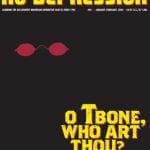Corey Harris – It’s all about showing my process of education
ND: Were there noticeable results — that audience buying your record, for instance?
CH: Every now and then, some kids will come up and say “Hey, we saw you with Dave!” and that’s cool, but other than that, the benefits are pretty imperceptible. That’s a pretty fickle audience. It’s constant touring that makes an artist more known — not letting them forget about you.
ND: The commercially-defined genre problem isn’t new. Researchers have pretty much come to the conclusion that there wasn’t such a thing as a “blues singer” in the first place — that the artists were songsters who played all sorts of things. Record companies detected a blues craze and pressed the performers to record the blues exclusively.
CH: Yeah. My impression, from knowing Honeyboy Edwards, one of his old partners, is that Robert Johnson, for instance, played everything, but that he was marketed as a blues guy. A lot of them were musicians just moving among the people, and if people asked, “Do you know this song?”, they’d be ready with the hits of the day, even ones that weren’t black music, really.
II. I’VE TRIED TO SHOW THAT I’M LEARNING
ND: Was reviving pre-war acoustic blues even an important goal for you?
CH: It was what I was doing best at the time, what I had down, as a street musician in New Orleans.
ND: In that city, it might have been practically anything!
CH: I got to know a lot of different types of New Orleans music. but a lot of tourists that come down there want to hear blues. They think it’s a blues town, which it isn’t.
ND: So at first you were heralded as an important acoustic blues revivalist, congratulated for being retro. With your other musical interests hidden away, how did you feel about that?
CH: I knew that I would be branded a certain way, so that was cool. I also knew that I had all this other music that I liked, and that I did before I did blues. But I wanted to introduce people to what I was hearing gradually. And I think of each record as a chronicle of where I am at a given time. I guess that’s how it is for anybody.
ND: With your CDs, you can track that; there’s a kind of story that gets told, disc by disc.
CH: I’ve tried to show that I’m learning. A guy like Tom Waits; he’s a guy I really like. If you look at his records from the mid-’70s through the late ’80s, he went through some major changes; he was always re-inventing himself, which shows.
ND: When you came along as a recording artist in the mid-’90s, there was, seemingly suddenly, a whole generation of young black men doing acoustic blues again: Alvin Youngblood Hart, Keb Mo, Guy Davis, Otis Taylor, Eric Bibb. Did you see yourself as part of a wave? Did you share something with the others?
CH: In some ways there was a connection, definitely. We’re all young black men into this type of music that a lot of black people — at least en masse — aren’t digging as much as they used to. It was talked about as if all of a sudden there were young black people doing this, but I don’t think that was the case. I think that all of a sudden people paid attention!
ND: How did that attention come to happen, and the arrival of this generation of musicians, right then?
CH: When Columbia released that Robert Johnson anthology and it took off, it was a big thing. Companies got interested in trying to do “something like that” on the contemporary side.




